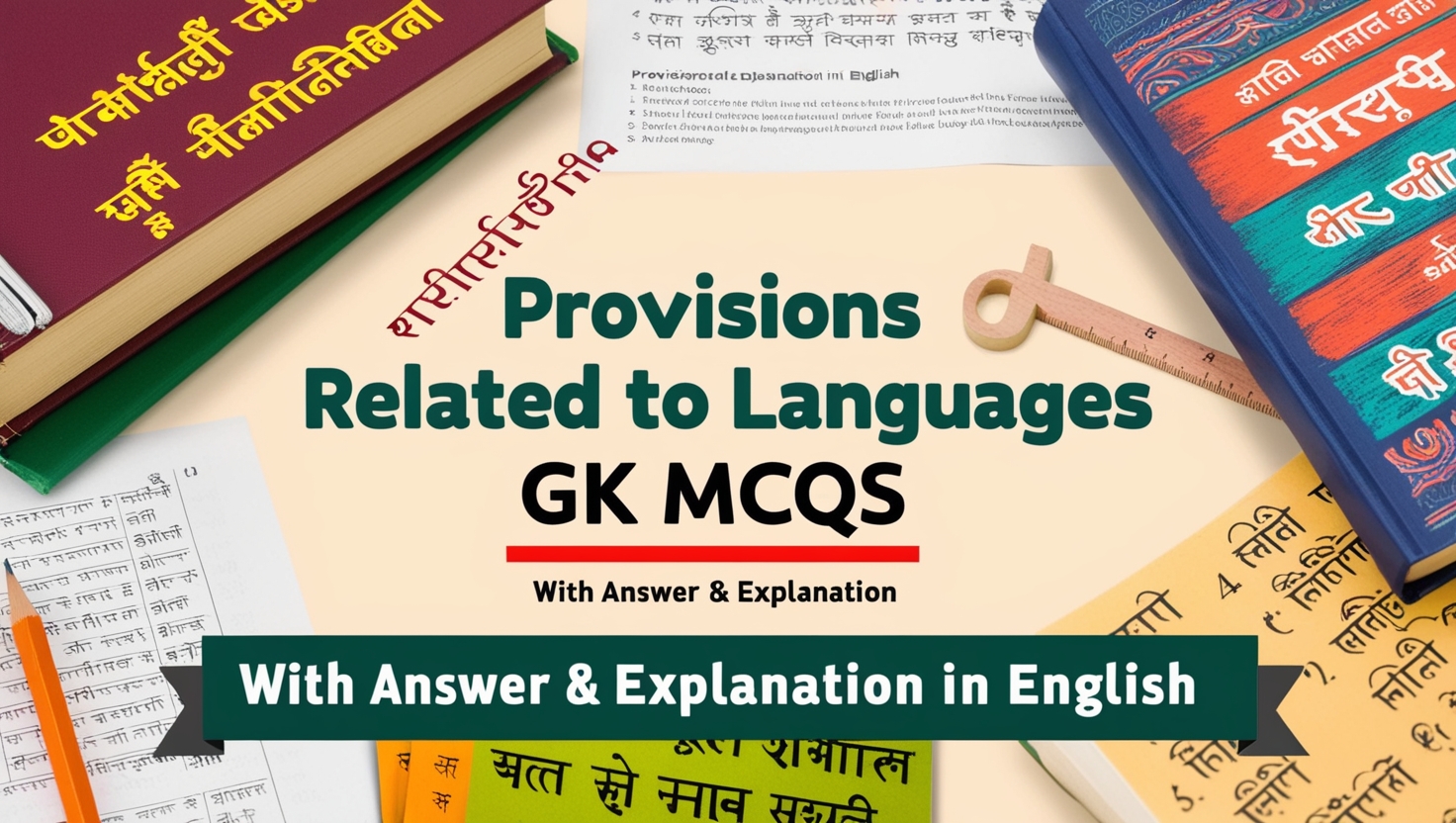
The Provisions Related to Languages GK MCQs With Answer & Explanation in English article focuses on important General Knowledge multiple-choice questions regarding language provisions in India.
These provisions, outlined in the Constitution, define the official languages used for governance, communication, and administration. This article is a useful resource for competitive exam aspirants, providing detailed explanations for each MCQ, helping them better understand the legal and cultural significance of language policies in India.
1. Which part of the Constitution of India deals with the official languages?
- Part XV
- Part XVII
- Part XIX
- Part XX
Show Answer
Answer: Part XVII
The Constitution of India, in Part XVII, specifically deals with the official language of the country, and this is addressed in Articles 343 to 351. These provisions encompass several aspects, including the language used by the Union, regional languages, language of the judiciary and texts of laws, and special directives.
2. Which form of numerals are used for the official purposes of the Union?
- International form of Indian numerals
- Devanagari form
- Brahmi form
- Sanskrit form
Show Answer
Answer: International form of Indian numerals
Article 343 of the Constitution mandates that the form of numerals used for official purposes of the Union is the international form of Indian numerals. The Devanagari form of Indian numerals is not employed for these purposes.
3. In which year did the President of India appoint an Official Language Commission under the chairmanship of B.G. Kher?
- 1950
- 1955
- 1957
- 1965
Show Answer
Answer: 1955
In 1955, the President of India appointed an Official Language Commission, with B.G. Kher as its chairman. This commission submitted its report to the President in 1956.
4. In which year did the Parliament of India enact the Official Languages Act?
- 1963
- 1964
- 1965
- 1966
Show Answer
Answer: 1963
The Parliament of India passed the Official Languages Act in 1963. This act allows for the continued use of the English language, in addition to Hindi, for all official purposes of the Union and the transaction of business in Parliament, even after 1965.
5. Which of the following are correctly matched? State Language
1. Andhra Pradesh – Telugu
2. Kerala – Malayalam
3. Assam – Bodo
4. Uttar Pradesh – Hindi
Choose the right answer:
- 1, 2, 3
- 2, 3, 4
- 1, 3, 4
- 1, 2, 4
Show Answer
Answer: 1, 2, 4
Many states in India have adopted their major regional language as the official language. For example, Andhra Pradesh uses Telugu, Kerala employs Malayalam, Assam has Assamese, and Uttar Pradesh uses Hindi as their official languages.
6. According to the Official Languages Act (1963), which language should be used for purposes of communication between the Union and the non-Hindi states?
- Any regional Language of the State
- English
- Any language specified by the Supreme Court
- None of the above
Show Answer
Answer: English
As per the Official Languages Act of 1963, English is to be used for communication between the Union and the non-Hindi states, which are those states that have not adopted Hindi as their official language.
7. Who appoints a special officer for linguistic minorities to investigate all matters relating to the constitutional safeguards for linguistic minorities?
- Parliament
- President
- Governor
- Prime Minister
Show Answer
Answer: President
The President of India appoints a special officer for linguistic minorities, responsible for investigating matters related to constitutional safeguards for linguistic minorities and reporting to the President.
8. Who can authorise the use of Hindi or any other official language of the state in the proceedings in the high court of the state?
- President
- Chief Justice of India
- Governor
- Prime Minister
Show Answer
Answer: Governor
A state’s governor, with the prior consent of the President of India, has the authority to authorize the use of Hindi or any other official language of the state in the proceedings in the state’s high court.
9. How many languages are specified in the Eighth Schedule of the Constitution of India?
- 14
- 18
- 22
- 24
Show Answer
Answer: 22
The Eighth Schedule of the Constitution of India initially contained 14 languages, but more languages have been added over time. Konkani, Manipuri, and Nepali were added through the 71st Amendment Act of 1992, and Bodo, Dogri, Maithili, and Santhali were included via the 92nd Amendment Act of 2003.
10. Which of the following languages was added to the Eighth Schedule through the 71st Amendment Act of 1992?
- Bodo
- Manipuri
- Dongri
- Santhali
Show Answer
Answer: Santhali
Konkani, Manipuri, and Nepali were added by the 71st Amendment Act of 1992, and Bodo, Dongri, Maithili, and Santhali were added by the 92nd Amendment Act of 2003 to the Eighth Schedule of the Constitution of India.








Leave a Reply